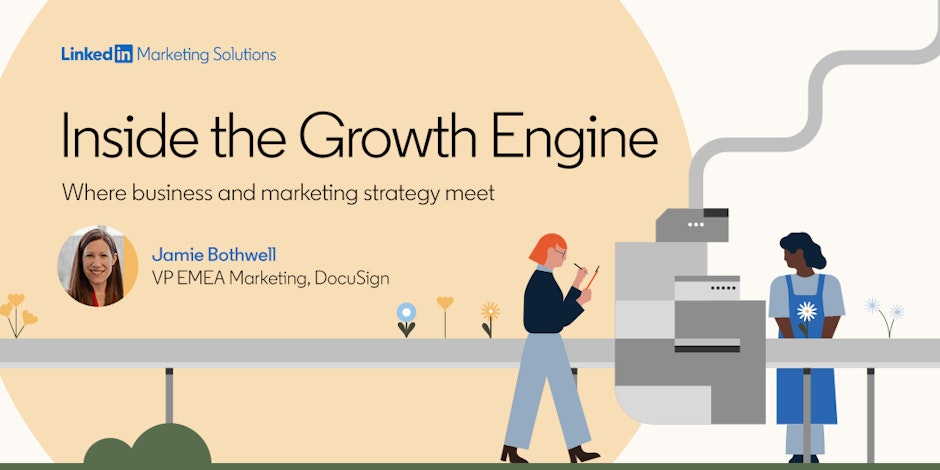DocuSign’s Jamie Bothwell on elevating empathy in B2B marketing
The VP EMEA Marketing at DocuSign, the Agreement Cloud company and leading e-signature provider, tells LinkedIn why it’s never been more crucial to bring the voice of the customer into the C-suite

If she hadn’t opted for a career in marketing, there’s a strong chance Jamie Bothwell would be spending her days sitting down with patients and talking about what makes them tick. “If I weren’t a marketer, I think I’d most love to be a psychologist,” says the VP EMEA Marketing for DocuSign. “I’ve always been really intrigued by human behaviour – what motivates people, what drives them and what sits behind all of that.”
It’s an instinct that fits very naturally with how Bothwell sees her role as a marketing leader at the world’s pre-eminent electronic signatures platform – and how she sees the future role of marketing itself. Her vision is of an empathy engine for the business – one that helps coordinate functions around an ever-clearer view of customer needs and the growth that results from meeting them.
Being ready to step into the conversations that count
“It’s important to remain focused on what marketing does best,” she says. “And that comes down to understanding the customer, understanding our product and the value it can provide and connecting those things together. That’s why it’s so important for marketing to have a voice at the C-suite level for any business. The critical thing is that there’s always someone in those conversations that is representing the voice of the customer and making sure every company decision is based on those fundamentals.”
In Bothwell’s view, marketers need to be ready to influence more of these decisions. The experience of the pandemic has left businesses more attuned to the fact that customer needs can change – and that customer experience can’t be left to chance.
“The pandemic has caused a lot of businesses to stop and think about how things have changed and what experiences they therefore need to provide to customers and employees,” she says. “It’s given us an opportunity to rethink things and consider how we can build experiences from scratch. We’re seeing a lot of DocuSign’s own customers thinking along those lines at the moment.”
Marketers as empathy evangelists
If B2B marketers are to play a lead role connecting customer needs and customer experience, then they will need to get comfortable operating outside of traditional marketing channels and taking on a broader role. “The customer experience doesn’t start and end with marketing,” says Bothwell. “We've got to be thinking about every different touchpoint that our customers experience with the company and that crosses multiple different functions. We need to understand where all the pieces fit and be ready to drive conversations in other functional areas of the business.”
The idea that marketing should represent the voice of the customer is nothing new, of course. What’s changed is our ability to tune into that voice on an always-on basis through data. It’s the availability of data and the recognition that businesses need to be agile in responding to it, that Bothwell sees revving up marketing’s potential as an empathy engine.
“The biggest evolution in marketing that I’ve seen in my career is the importance of data,” she says. “A decade ago, I would have spent most of my time looking at creative assets. Now, I’m spending the majority of my time using data to get close to all of those customer touchpoints. It’s about being on your toes, looking for signals and then being ready to respond to those signals. We’ve discovered that we need to get comfortable with agility.”
It’s data that puts marketing in touch with changing customer needs – and gives it the credibility and the evidence to help steer businesses towards greater responsiveness. However, Bothwell is clear that there’s more to executing on empathy than just looking at the numbers. “Marketing is both art and science and we need to bring data together with other sources of insight in a meaningful way,” she says.
How diversity and data drive customer-centricity and growth
Building more customer-centric organisations may be enabled by data – but it’s also a function of creative and strategic judgment. And Bothwell is very aware that such judgment depends on a fully representative marketing team. In her view, it’s not possible for B2B marketing to function at its best if it’s not actively planning for diversity – both in terms of personnel and the content of marketing activity.
“A focus on Diversity is a part of the culture at DocuSign and it’s something that I’m personally very passionate about,” she says. “It comes back to making sure what we do is representative of our customers and the value we can provide to them. People expect more from companies than they did in the past – and they also have a choice. That’s why it’s crucial to represent diverse perspectives and diverse cultures in B2B. We look at everything we put out into the marketplace with a diverse lens. Striving to have a diverse marketing team that represents our customer base really helps with that.”
It’s one of many ways that Bothwell’s view of B2B marketing extends far beyond simply putting together communications or campaign plans. She readily talks of employee experiences at the same time as customer experiences, thinks in terms of empowering the business as a whole to become more responsive – and cares deeply about diversity and culture. It all comes back to that fundamental interest in people and how understanding what makes them tick is the most important force moving businesses forward. And it anticipates marketers taking on a broader role as the importance of empathy increases.
“If you think about what marketing is responsible for, it’s really driving the growth of the company,” she says. “I think senior marketers’ roles could evolve to reflect that.”

